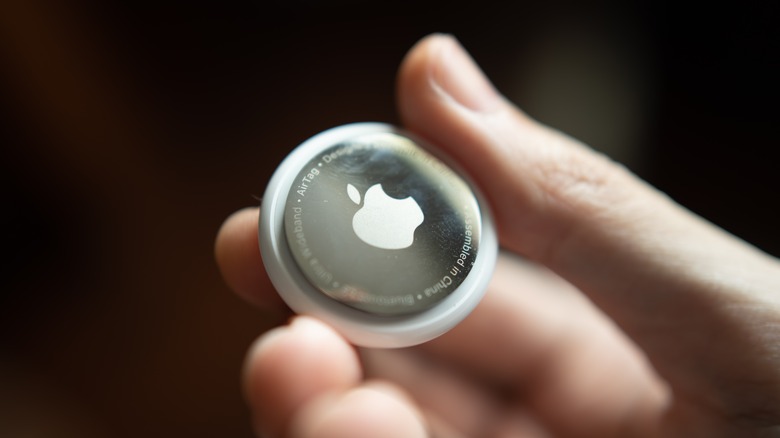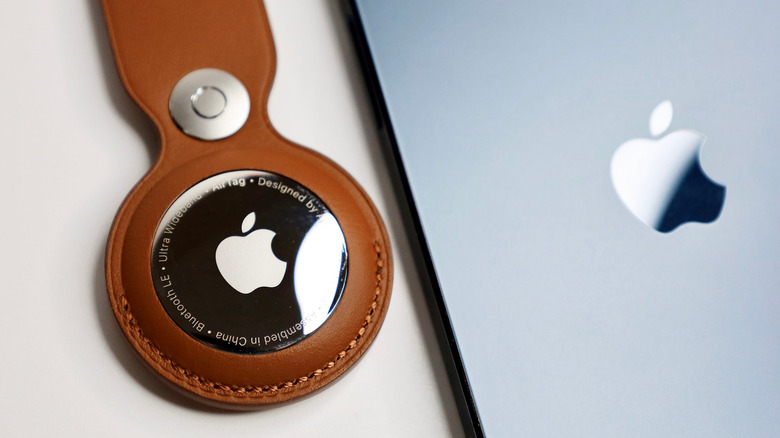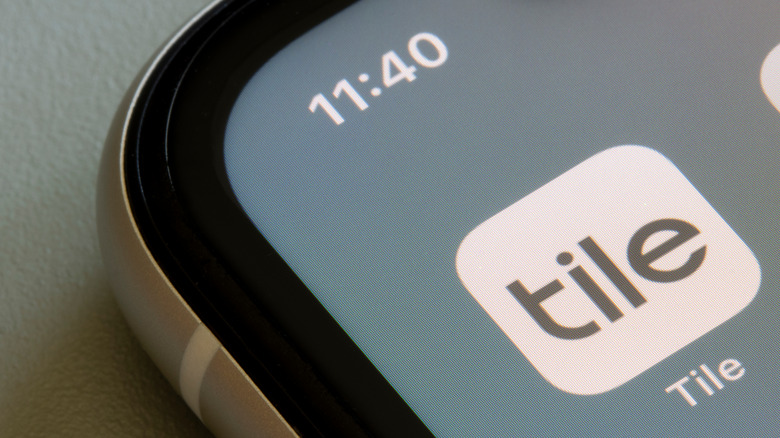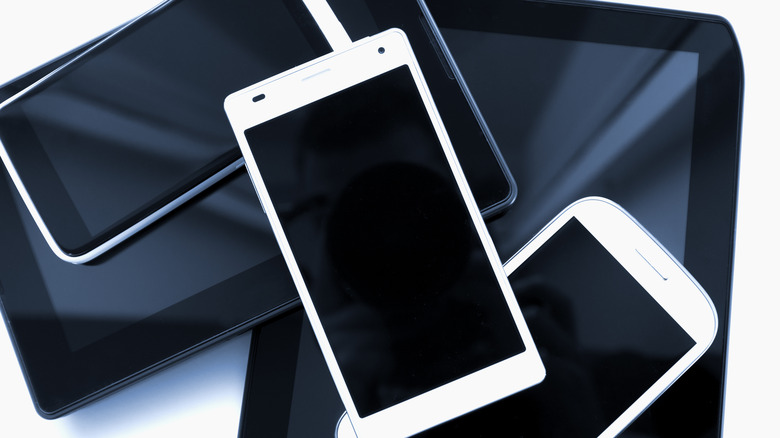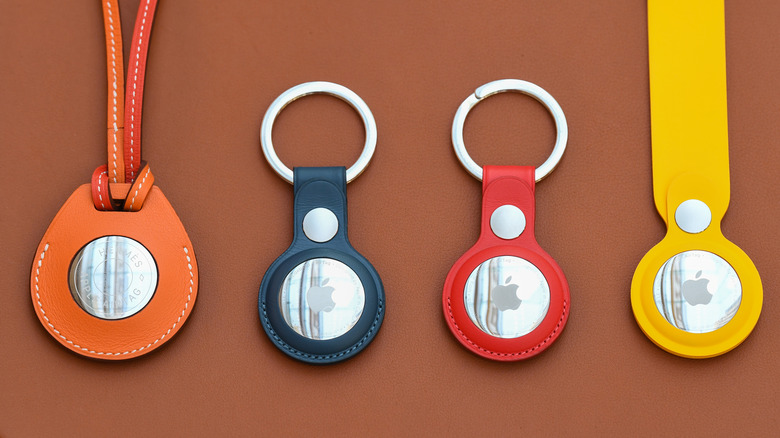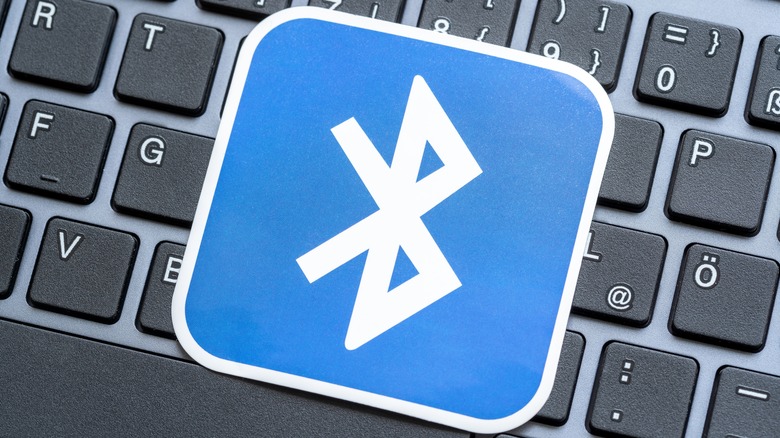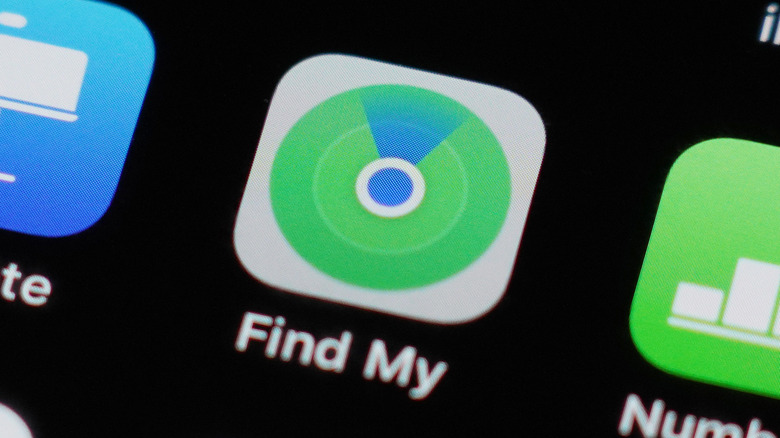Apple AirTag Vs Tile: Which Is The Better Bluetooth Tracker?
Bluetooth trackers are small, convenient devices that help you pinpoint the location of just about any item you choose. They've existed as products for around a decade now, though Apple only joined the competition in 2021. Tile, on the other hand, released its first tracking device way back in 2013, and it has been updating and improving its core product ever since. Though the two products may look pretty similar, AirTag and Tile offer significantly different features and services, making pre-purchase research essential.
The most striking difference is, of course, compatibility. Apple AirTag, in true Apple fashion, only works with first-party devices — so you can only use iPhones, iPads, Macs, or MacBooks to track your AirTag and the item it's attached to. Tile, however, is designed to work with both Apple and Android devices, so you can use them with just about any device. Location accuracy, safety features, software, and optional personalization are other areas of interest where the two products differ. Let's take a look at the details.
What is an AirTag?
Apple AirTags are little disks made out of stainless steel and plastic with built-in speakers. Its replaceable battery lasts for about a year, so you can slip it into your bag and forget about it. Once your AirTag is in place, everything else is dealt with through your paired Apple device. Using the Find My app, you can tell your AirTag to make a noise when your item is nearby or see its location on a map when it's far away.
When you're close to your AirTag, your phone locates it via the Bluetooth signal the AirTag sends out. When your AirTag is far away, it's located using the Find My network. This network is made up of all the Apple devices in the world, so any device can pick up the AirTag's Bluetooth signal, send its location information to iCloud, and securely deliver it to your Apple device.
If you want to attach an AirTag to your keys, a slim wallet, headphones, or another small item, there's a variety of accessories available for the job. These range from leather loops to plastic clips and secure luggage tags, with plenty of colors and styles to choose from. You can even get your AirTag engraved with your initials or emoji when you buy directly from Apple.
What is Tile?
Tile products are small plastic tags that come in a range of shapes and sizes. The smallest is Sticker, which is under three centimeters in length and comes with an adhesive back. The largest is the pro, which is around six centimeters long, has the loudest speakers, and has a handy hole so you can attach it to your desired item. There's also a Slim model that's shaped like a credit card and specifically designed for wallets, and a pet-tracking model called Tile for Cats.
Like AirTag, Tile trackers work by emitting a Bluetooth signal that the paired smart device can pick up. Depending on the model, Tile products have a range of 150 to 400 feet. Once your Tile goes out of range, it's located through a network similar to Apple's Find My network, made up of all the devices with the Tile app installed, plus their network extenders.
Other features of Tile products include a QR code on the back that you can link your contact information to, so helpful citizens can help return a lost Tile to you when they find it. Additionally, if you happen to have your Tile-equipped keys on hand but can't seem to find your phone, you can make it ring by double-pressing the logo button on your Tile.
Compatibility
The most stand-out difference between AirTag and Tile is compatibility. AirTags are designed to smoothly pair with your device in just a few button presses but, as you might expect, that device has to be made by Apple. It makes them the obvious choice for owners of multiple Apple devices because it's hard to beat the seamless collaboration between the various different products. Once you've connected an AirTag to your Apple ID using an iPhone, iPad, or iPod touch, you can locate the tag using any Apple device attached to that ID. This means you can locate an AirTag on your Mac, MacBook, or Apple Watch.
While seamless compatibility with a limited number of devices is Apple's strength, free-form compatibility with a large range of brands and devices is Tile's. They work with both Apple and Android devices, meaning you can pair your Tile with anything from an iPhone to a Samsung, Google Pixel, or a OnePlus, as well as any Android tablet.
The main requirements for a pairing device are an up-to-date OS and Bluetooth 4.0 or higher, though some devices such as the Huawei P40 and above are not supported. Smart assistants like Echo, Alexa, Google Nest, and Siri also count as compatible devices. You can even access your Tile account on a desktop computer or laptop, but Tile says their service works best on a mobile app.
Product line
The two companies have taken different approaches to their product line, as well. Apple offers just one version of the AirTag and it's simply a small disc with no built-in attachment methods. If you want to attach it to a set of keys or tie it to a bag, you'll need to purchase an accessory. These accessories, of course, are high-quality and come in a variety of styles and colors but they can also set you back as much as $39.00 for a leather loop, or $349.000 for a Hermes collaboration keyring. One add-on you don't have to pay for though is the engraving service — you can add your initials or favorite emoji to your AirTag for free as long as you buy straight from Apple.
Tile offers a whole range of products in different sizes, with different speaker volumes and Bluetooth ranges. The Pro model, however, is the only Tile that has a replaceable battery — something that all Apple AirTags have. On the plus side, you don't need any accessories for Tile products because they all have built-in attachment features. To add a splash of color, special edition versions of the products are also available, such as the Slim model in the Supernova color or the Mate in Stardust. Similar to Apple, Tile also offers an engraving service but it's not free, and it's aimed at brands and businesses so there's a minimum order of 25 pieces. Tile also has partnerships with brands like Lenovo and HP that offer products with built-in Tile tracking technology.
Location accuracy and network
AirTag and Tile also have different strengths when it comes to Bluetooth and network location accuracy. The AirTag's direct range is around 33 feet or 10 meters. The Precision Finding feature requires you to be in direct Bluetooth range but it's designed to help you find items inside your house or even in the same room as you, so the range doesn't need to be that extensive.
For any other kind of location task, Apple relies on its Find My network, which allows any active Apple device to pick your AirTag's Bluetooth signal and send it through iCloud to your paired device. This network can provide high location accuracy due to the sheer number of Apple devices out in the world.
Tile, on the other hand, focuses more on their Bluetooth range and less on their network. The smallest Tile available has a Bluetooth range of 150 feet or 46 meters, and the Pro model has a huge 400 feet or 120 meters. This means your paired device can receive a signal directly from your Tile over a much greater distance than an AirTag. However, for long-distance locating, Tile is at a disadvantage. Its network relies on devices with the Tile app installed but these numbers are thought to be much lower than Apple's.
Software and features
Both products use an app to help you locate your Bluetooth trackers and the items they're attached to. For Apple users, this is the Find My app — the same built-in app you use to track your Apple devices and registered items. The app gives you a range of features to help you locate or keep track of your AirTag, including map location and playing a sound within Bluetooth range. Lost Mode shares a message with anyone that finds your lost item, and you can also turn on notifications that pop up when you leave an AirTag behind somewhere or walk a certain distance away from it.
The Tile app also allows you to locate your nearby item, play a sound, and attempt to locate the item when it's far away. However, to access features like Smart Alerts that notify you when you leave a Tile behind or 30-day location history, you'll need to subscribe to a Premium plan. This costs $2.99 per month or $29.99 per year, and there's also a Premium Protect which entitles you to $1,000 of reimbursement if Tile can't find your things. This plan costs $8.99 per month or $99.99 per year.
Safety
Safety is a key concern when it comes to Bluetooth trackers. When Apple released the AirTag in 2021, the launch was marked by concerns over potential digital stalking. The fear was that stalkers could buy an AirTag, hide it on your person somewhere, and track where you went. To combat these concerns, Apple bolstered AirTag's security features to discourage unwanted tracking. When an unregistered AirTag is traveling with you and away from its owner, you'll receive an alert on your iPhone. After a while, the AirTag will even be forced to play a sound to help you locate it. Location information passed through devices and iCloud also stays anonymous and encrypted so no one but you can see where your AirTag is.
Tile provides a similar Scan and Secure feature that lets anyone with the Tile app scan and detect unwanted Tiles traveling with them. However, you have to initiate this scan yourself because you won't get any alerts. Additionally, Tile also has an Anti-Theft Mode that users can turn on to hide their Tiles from the Scan and Secure feature which arguably negates the security measure entirely. If a stalker wanted to use a Tile to track someone, they would just have to turn on Anti-Theft Mode first.
Which Bluetooth tracker is right for you?
All in all, AirTag and Tile are both useful products, each with their own strengths that are aimed at different kinds of people. If you're not an Apple user, for example, then Tile is obviously the better product for you. If you are an Apple user, it definitely makes more sense to take advantage of Apple's superior Find My network to maximize the chances of your lost item being found.
The decision mostly comes down to your preferred features, compatibility, and software, since the pricing for these products is very similar. An AirTag and the Tile Sticker model both cost $29.99, with other Tile models ranging between $24.99 to $34.99. Both options may require additional expenses, such as accessories for AirTag and the Premium subscription for Tile. Both products also include a range of ways to personalize your tracker and add color, so you can track your belongings in style.
